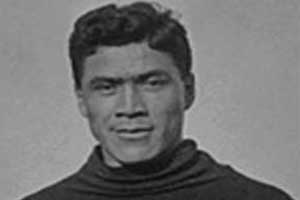Albert Exendine (1914-1922)
In 1942, Jim Thorpe was asked to list his all-time college football team. The first name he wrote down was an offensive end named Al Exendine. The Carlisle All-American would become Georgetown's first great football coach and begin a run of sustained excellence for the school's teams.
A member of the Delaware Nation in the Oklahoma Territory, Exendine (his tribal name was "Toopeaning") was sent to the Carlisle Indian School in Dickinson, PA at 15, graduating with the trade of a blacksmith in 1906. He had never played football before arriving at Carlisle, but under Glenn (Pop) Warner he became the first All-American from the school. His parents had greater expectations of Al being a blacksmith, so he enrolled at neighboring Dickinson College for a law degree, working at Carlisle to make ends meet and serving as a mentor to the next great Carlisle star, Jim Thorpe. By the early 1910's, he had to choose between coaching and the law, which he saw as a means to improve the conditions of tribes in Oklahoma.
The offer from Georgetown in 1914 was serendipitous. For five months each year, Exendine would coach football and work with the Bureau of Indian Affairs in Washington, then return home after the season to practice law in Tulsa, OK. It made Exendine one of the most prominent Indian attorneys in the nation and also one of its most prominent football coaches. Having learned the Warner offensive system first-hand, he brought a new level of skill to the Georgetown teams that its former coaches, mostly recent grads from Ivy League colleges, could not match.
After one year to adjust to the new system and get players that bought in to the system, Gerogetown was on its way. In 1915, Georgetown was a surprise team in the East, going 7-2 with narrow losses to Princeton and Army while shutting out North Carolina, North Carolina State, South Carolina and St. Louis, the latter two by a combined score of 151-0.
The 1916 season was even better. Following a hard-fought 13-7 loss at Navy, Gerogetown won its final nine games of the season, outscoring opponents 474-33, the most points scored by any major college team that season. Led by RB Johnny Gilroy, Georgetown earned wins over Dartmouth, Fordham, and Tulane, the latter by a shocking score of 62-0 at New Orleans. Exendine's use of mis-direction run plays and the still evolving forward pass made Georgetown one of the most dangerous teams of the 1910's, which continued in 1917 with a 7-1 record, losing only to Navy.
Exendine's eight consecutive seasons without a losing record from 1915 to 1922 remains a school record. His 1921 team was another gem, going 8-1 with a single loss at Georgia Tech, 21-7. In his nine seasons, Georgetown lost only four games by 14 or more points, and won 55 under his tutelage by an average margin of 32 points per game.
In 1923, Exendine took an offer at Washington State, but found the caliber of athlete was far less than what he had enjoyed at Georgetown, going 6-13-4. Future stops at Occidental (CA), Northeastern (OK) and Oklahoma A&M were not as successful as his years in Washington.
Al Exendine retired from coaching in 1935 and returned to a full time law practice in Tulsa. He was selected to the College Football Hall of Fame in 1970.
| Year | Record | Pct. | Home | Away |
| 1914 | 2-4-2 | 0.375 | 2-2-1 | 0-2-1 |
| 1915 | 7-2 | 0.777 | 4-0 | 3-2 |
| 1916 | 9-1 | 0.900 | 5-0 | 4-1 |
| 1917 | 7-1 | 0.875 | 3-0 | 4-1 |
| 1918 | 3-2 | 0.600 | 3-1 | 0-1 |
| 1919 | 7-3 | 0.700 | 6-0 | 1-3 |
| 1920 | 4-4 | 0.600 | 4-1 | 2-3 |
| 1921 | 8-1 | 0.888 | 6-0 | 2-14 |
| 1922 | 6-3-1 | 0.650 | 5-2 | 1-1-1 |
| Totals | 55-21-3 | 0.667 | 38-6-1 | 17-15-2 |
